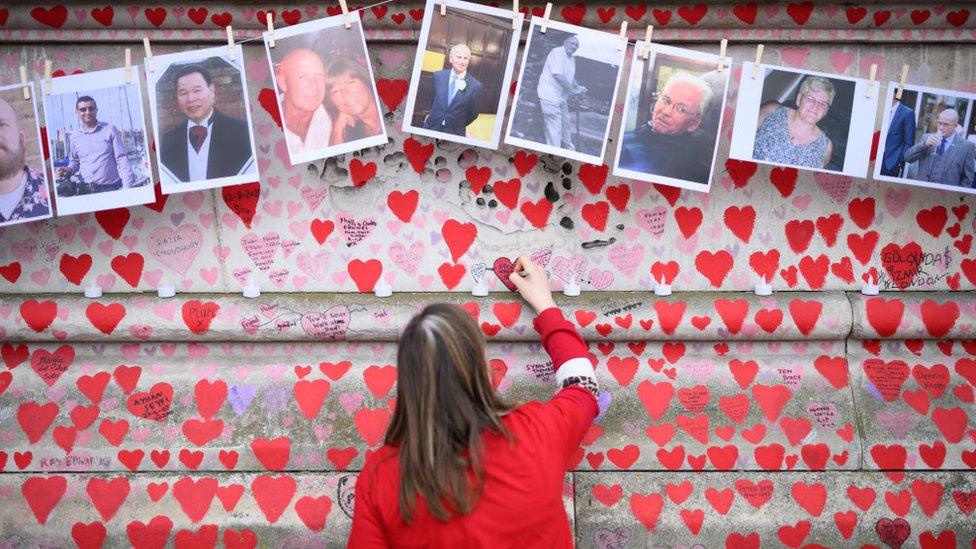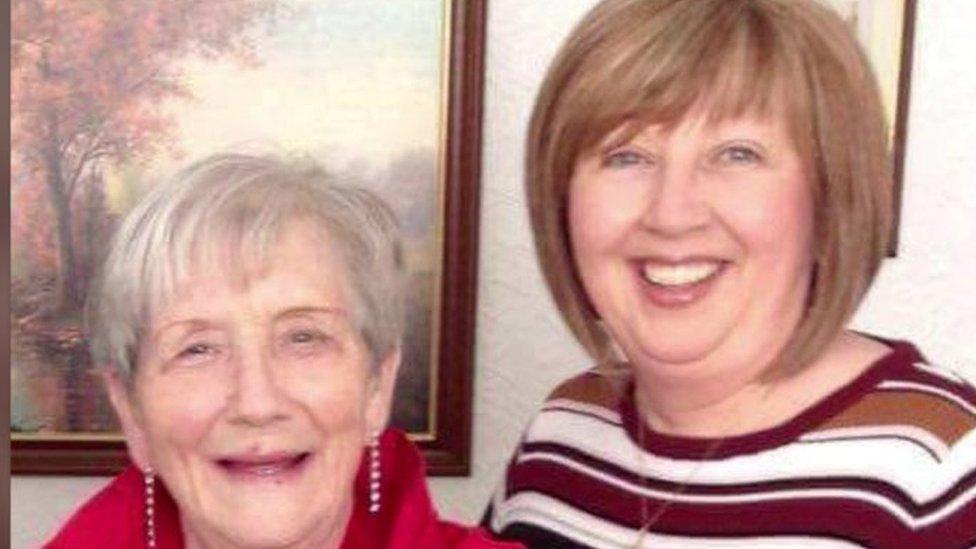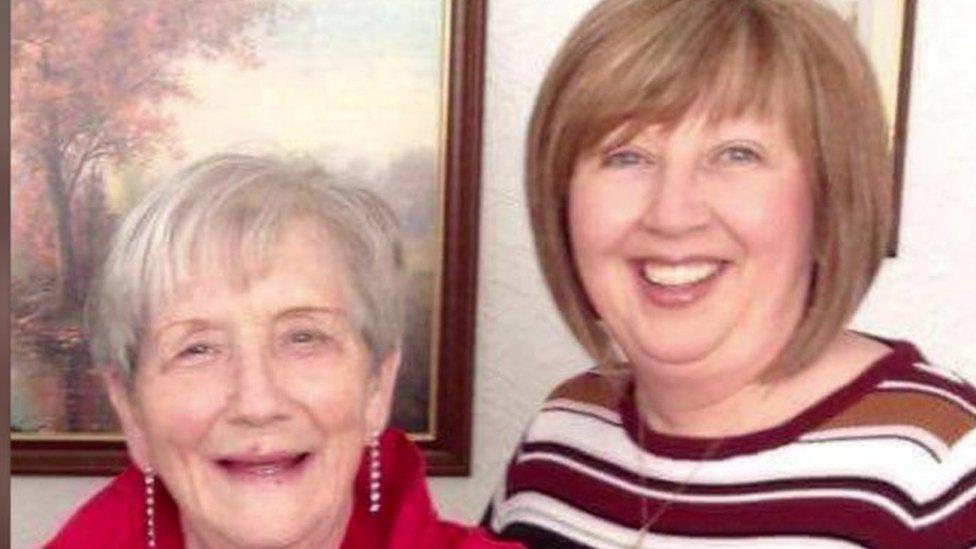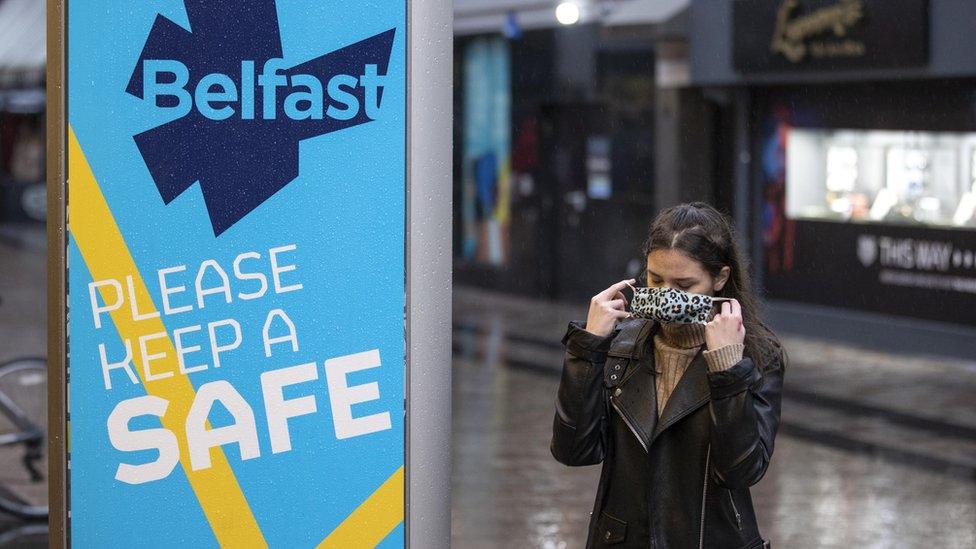Covid-19: Bereaved Northern Ireland families in London for inquiry
- Published

Representatives from five NI families travelled to London on Tuesday
Northern Ireland was 18 months behind the rest of the UK in pandemic preparedness, a lawyer has told the UK Covid-19 Inquiry.
Ronan Lavery, KC, who represents Covid-19 Bereaved Families for Justice NI, was speaking at the start of the inquiry's public hearings in London.
The inquiry was launched by former Prime Minister Boris Johnson in 2021.
It will cover pandemic decision-making in Westminster and the devolved administrations.
The Department of Health's barrister Neasa Murnaghan told the inquiry the response in Northern Ireland was "effective and coherent".

Brenda Doherty and her mother Ruth Burke who died with Covid-19
The first strand will examine the preparedness of the UK and assess if the pandemic was planned for properly.
Opening the inquiry, the chair Lady Heather Hallett noted the "dignified vigil of bereaved family members holding photographs of their loved ones" when she arrived on Tuesday.
"Their grief was obvious to all," she said.
Mr Lavery told the inquiry that people in Northern Ireland were at a "distinct disadvantage".
He told the inquiry that a large part of the Civil Contingencies Act 2004 , externaldid not apply to Northern Ireland and that the problem was not just devolution, but that in 2004 the NI executive and the Assembly were in suspension.
"There was no equivalent devolved legislation ever introduced despite this being a key recommendation of the Cygnus report and despite the Northern Ireland Secretary of State's expectation in 2005 that Northern Ireland would have 'a similar level of protection for its citizens as experienced elsewhere'," he said.
Exercise Cygnus was a cross-government exercise designed to test the UK's response to a serious influenza pandemic which took place in 2016.
The inquiry also heard that there was "a lack of knowledge among political leaders as well in relation to central government planning and preparedness and the reasons for it".
He added that Northern Ireland did not attend important UK-wide pandemic meetings before March 2020.
There was a disconnect between Westminster and Stormont, he said, adding:
a request by Professor Ian Young, NI's chief scientific advisor, to join the chief scientific advisor UK network was turned down
there was no record of Northern Ireland participating in important SAGE (Special Advisory Group for Emergencies) and Cobra meetings before March 2020
political dysfunction in Northern Ireland meant it was unprepared for the pandemic
Mr Lavery also said EU exit preparations also impacted preparations, adding "Northern Ireland was more than 18 months behind the rest of the UK in terms of ensuring sector resilience to any pandemic flu outbreak".
Ms Murnaghan said there was a clear structure within the Department of Health and their "main priority from day one was the protection of Northern Irish citizens from the virus".
"Throughout these first stages, there were improvements in Northern Ireland's reaction to the pandemic as a result of increased availability to testing, improvements in pandemic modelling, improved understanding of individual and population behaviours and how they were influenced by modelling, and by the development of vaccines and how their rapid deployment was effected as well as the impact of non-pharmaceutical interventions," she added.
She told the inquiry that preparations for a no-deal EU exit did divert attentions away from pandemic preparedness, but said on the "positive side" there was additional training and increased stockpiles for medicines and medical devices.
Family testimony
At the start of the day the inquiry showed a video hearing testimony from bereaved family members, including those from Northern Ireland.
Some had travelled to London for the first day.
Brenda Doherty said her mother was one of the first to die at the start of the first lockdown in March 2020.
"Mum was our world," she said.
"It's a very important part of history and history has to reflect the truth of what happened to families like mine."
Catriona Clarke talked about losing her 67-year-old father to "hospital-acquired Covid" in December 2020.
"The circumstances surrounding the lead-up to his death and his eventual demise will haunt us for the rest of our lives," she said.
"We need to know that lessons will be learned and that future generations will be safeguarded from the heartache that we have had to suffer," she said.
Related topics
- Published25 April 2023

- Published2 November 2022
